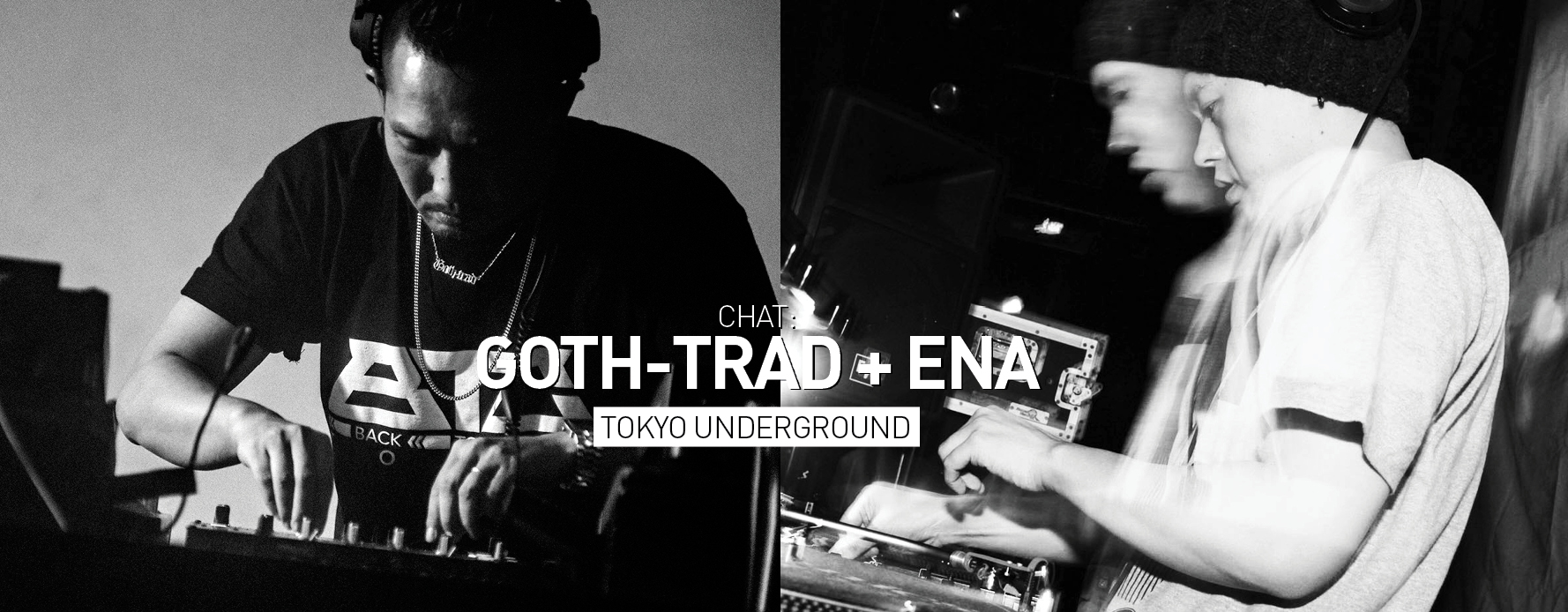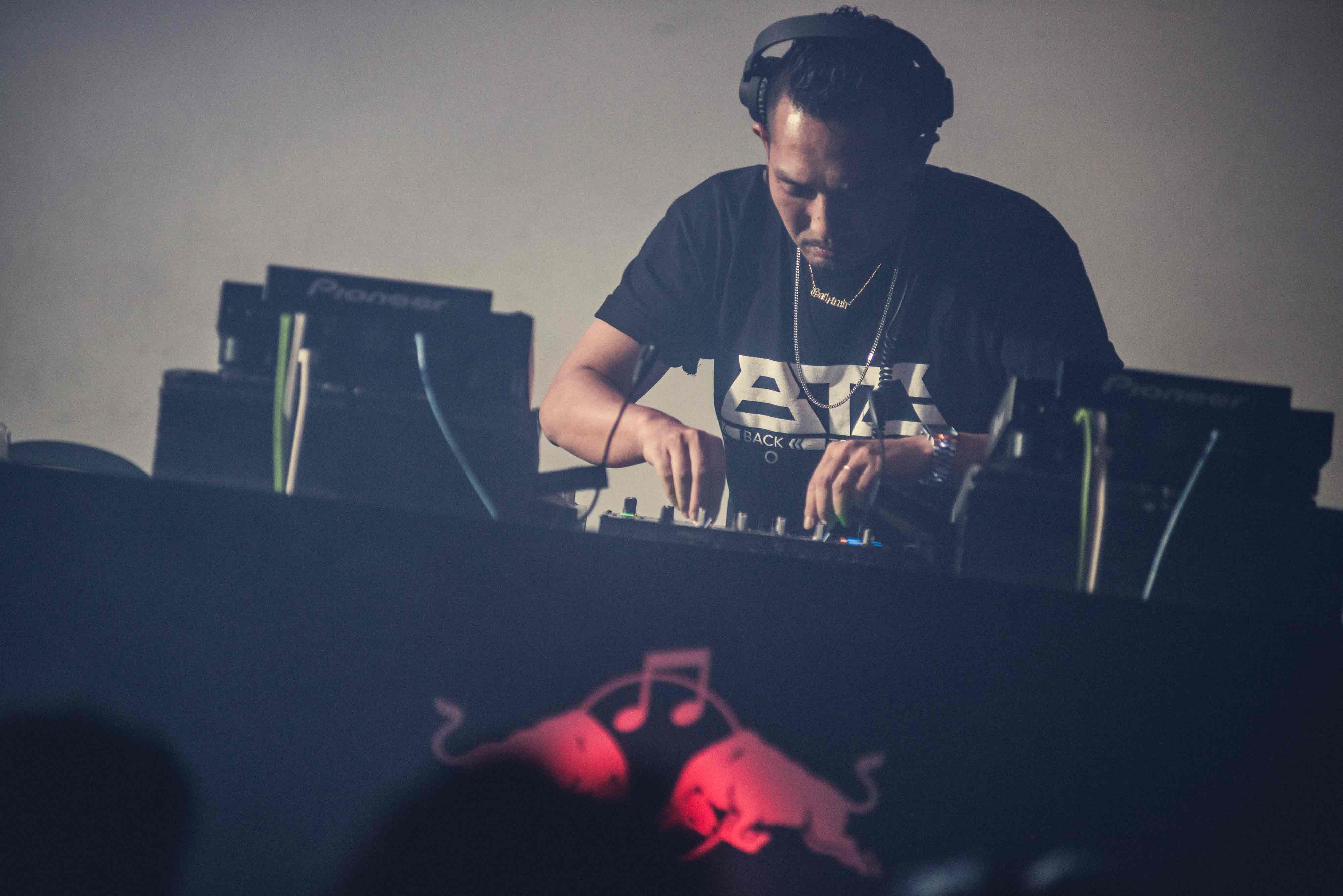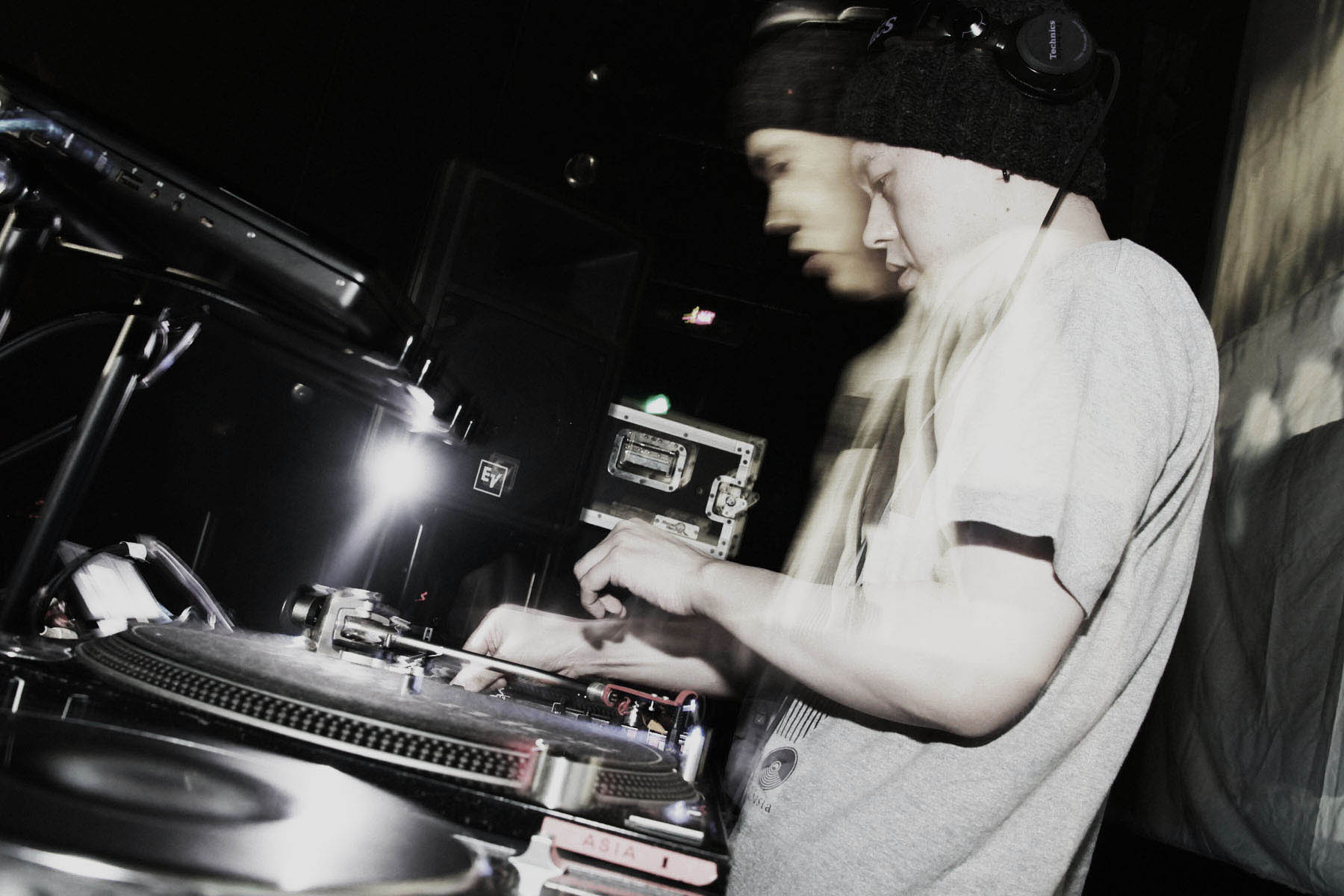Goth-Trad & ENA: Chill Back-to-Back
 Thirsty for JUICE content? Quench your cravings on our Instagram, TikTok and WhatsApp
Thirsty for JUICE content? Quench your cravings on our Instagram, TikTok and WhatsApp

The Japanese dubstep scene might have shrunk considerably, yet Takeaki Maruyama aka Goth-Trad is still the poster boy of that scene today – even when the genre name has been rendered meaningless and he’s disassociated himself from being pigeonholed into it. Still, operating his Back to Chill party series for some eight years and manoeuvring himself, his newly minted label, and his parties to operate under the bigger ‘bass music’ umbrella term, Goth-Trad continues to make electronic tunes on the extreme spectrum of the genre and kicking ass at it. Joined by crewmember ENA, JUICE sat down with the two in what looked like the opposite of extreme, a dainty faux-European café in Shibuya, for an extended discussion on juke otakus, bashment elitists, j-pop, and ‘genre’ as an increasingly irrelevant concept…
We spoke to a Japanese juke artiste earlier and he told us something very surprising, the juke scene in Japan isn’t anywhere near as big as music journalists made it out to be. Being one of the most famous Japanese DJ-producers to have come out of the dubstep scene, what’s it like for you guys?
Goth-Trad It’s pretty small. The scene is changing every moment. For example, we started the Back to Chill party eight years ago. The [party] people there, they’re used to bass music. At that moment, people were just starting to know about dubstep or something like that. And then we had a peak time, a peak moment [for] dubstep and people who were into bass music, it became trendy. Even DJs who were playing electro started saying they played bass music.
When was the peak, you think?
G It was like 2011, 2012? At the same time like in 2012, some people started to play juke. So now at the moment, it’s kind of different thing; small, very small (dubstep, I mean). In the world, the dubstep scene is huge, the parties are very busy. In Japan, not very big. Not super big. It’s not like compared to other countries.
Even though you have a very strong dub/reggae scene, you think that it’s not that strong anymore?
G Still, there is a community.
Like real Japanese sound systems? There isn’t a single sound system in Malaysia.
G Ah, sound system culture only picked up with the dancehall, bashment scene. Like you know, Mighty Crown, that kind of scene. Dancehall reggae is huge but it’s not like dub reggae, it’s more like bashment dancehall. So many followers for Mighty Crown – Mighty Crown is very, very traditional bashment style, but they know reggae dub as well. Their followers are into kind of like commercial dancehall, like pop reggae; pop, hip hop, mix up together. For a moment, it was huge! They had a big, big festival and big studio. Since 2010 though, it’s getting smaller. Sound system culture may be big in the dancehall scene but not for us.
There is no crossover?
G No crossover, and the later dub scene is not big – not very big. It’s kind of there, it’s close. So, we don’t crossover. But we want to, it’s kind of difficult to crossover with that kind of people.
Why is it difficult?
G You know, we listen to dancehall, we listen to reggae, dub music. But they don’t listen to us.
Is it because of the generational gap?
ENA Depends, because some of the sound system guys are of the same generation as us.
G Yeah, yeah. They are more commercial, they are doing more commercial dancehall. They have a good sound system but they are doing more commercial dancehall, dancing the same dance and it’s a shame you know? We like some of that dancehall stuff, but they don’t like what we do. They [were] never into underground music.
But like the juke kids and stuff. There is a crossover for you guys?
G Yeah.
The juke artiste we spoke with mentioned that the bass guys always invite them to play; no one else would invite them to play, only the bass guys.
G It’s really complicated [now]. Otaku culture is starting to get into the Japanese underground music scene in this century, the last two years. It is kind of good, but I don’t know that kind of culture very much.
What do you mean by that though? Otaku culture getting into that scene?
G It’s a complicated crossover among otaku music culture, music scene, and underground music scene. For example, Hatsune Miku.
E Hatsune Miku is a vocaloid, kind of like a software; an animated singer. You can type the lyrics into the programme, that scene is really big.
Do these otakus actually go to club or do they just stay in their room and listen to your stuff?
G Oh yeah, that is the problem. They like underground music but they don’t go out.
They don’t support the music?
G They support. They like underground music but they don’t come to parties. But it looks like the juke scene is kinda like the new generation coming into that.
E For the younger generation, otaku is kinda cool now.
G For us, I’m 35, 36, our generation, otaku is… (makes a disapproving expression).
Aren’t otakus essentially nerds? They’re cool now?
G It’s kind of cool. It used to be very weird people, but now so many of the young generation, the younger people, are into anime. They are influenced [by] anime because anime, manga is huge culture in Japan. Of course we grew up with anime and manga, [but it was] a little bit different, you know? With otaku culture, basically, they would want to support underground anime and manga, so it’s kinda the same direction with their interest in music, you know? Supporting underground music, underground culture, and then when the artiste blows up, becoming a big name, they’d have pride in saying “Oh, we support that artiste.” Something like that, it’s the same. So, with juke culture, I like Furutono (DJ Fulltono) of Booty Tune, y’know. But to be honest with you, I don’t really care about genres anymore, like since two, three years ago. Because bass music is like a big umbrella term, it’s a big section now. I sometimes book the juke guys for my parties, for example we booked Fulltono for the Back to Chill 8th anniversary, because I like his set and DJ direction. So, I know some juke DJs, but it depends on what the artistes play.
Do you put juke into your own set though?
G No.
Because you don’t like juke (laughs).
G I like some juke! But we have some juke DJs coming to my party and liking my set or some other guy’s set – the Back to Chill sound. So, it’s kind of an interesting thing in Japan, I know some techno people, juke people, hip hop guys, it’s all kind of mixed together. Maybe especially now, people don’t care about genres anymore.
So who’s coming to your ‘Back to Chill’ parties? You say that the audience are not purists, they like pretty much everything?
G We’ve been holding the party for eight years now, maybe 80% of the original audience have changed. At the moment, every year new people would come in, and the [older] people leave.
Have you guys changed your sound over the eight years as well?
G Yeah, we are changing.
Does that influence the people who go to your shows?
G Yeah. I think so, because it works. Every DJ is playing new stuff made by ourselves. And I’m always playing dub, bass tunes by myself – getting a new dubplate playing new stuff every moment, every month. But in Tokyo, people are coming regularly and sometimes going outside to the countryside. The crowd is kind of late. They don’t know what is happening now. For example, I went to Hiroshima months ago, they expected dubstep — I do play dubstep but more different stuff as well.
Especially nowadays, it could destroy the whole thing if people keep on saying dubstep is this and that. It’s all eclectic music, right?
G Especially at my parties, there were DJs producing music and playing something different, fresh music. Maybe eight years ago, people don’t know dubstep, which is why at the beginning I tried to push the dubstep sound.
But also eight years ago, it was totally different, that was the freshest thing.
G Especially for the Japanese people. We are also moving forward, changing the music, trying to play fresh music. Now, it’s kind of a very unexpected sound that we do. The only constant is it’s bass, more extreme bass, we play extreme bass music.

So many people in your crew… But are you the only person who can live off from music?
G [ENA] is also doing another music gig.
What’s your day job?
E I make sort of commercial music for TV.
G He also does the engineering.
Apparently you produce some j-pop as well?
E Yeah.
Do you try to put some of your own music influence into j-pop?
E (Laughs) It’s me but it’s kind of not me.
G It’s really crazy, one side: It’s really pop, not electronic but actually like rock music. Other side is really underground sound.
E Like for example, now I’m working on a ballad, the loud ballad. It [has] acoustic guitar and the piano and the programming orchestration. Yeah, it’s totally different. But yeah, it’s my job.
G It doesn’t make sense but it does make sense (laughs).
E It’s kind of like the two sides of the extreme.
Is it something you are interested in or is it just a job for you?
E To be honest, I don’t like that kind of music but processing that music is not so far from underground music. Basically, I like making music, so I like my job. One thing I don’t like is the clients (laughs).
No one likes clients. Never happened before.
G With Japan, making money from our type of music is really hard. The scene is small, but doesn’t look small. So many good clubs, so many good parties every weekend, and so many DJs coming from the UK and the US, and the big crowd. But locally, you know, maybe it’s the same in Malaysia, it’s always international DJs coming to the parties and the local DJs and artistes find it difficult to get shows. It’s the same in Japan. It’s always the promoters pushing international DJs like “Hey, the big DJ is coming here, blah blah blah!” And smaller DJs don’t even get any fee sometimes. So many local DJs get like 30 dollars or a bit more – nothing sometimes. “Oh, you should bring 10 people, we give you the discount list, you should fulfil.” Sometimes, some parties there are 20 DJs, three floors, only 200 people, and that is if each DJ managed to collect those 10 people. In Japan, most of the parties work like that. It’s not cool, you know. Like some good parties would only need five DJs on the main floor. Or four DJs. It’s really hard to get people to come to parties here. I know so many young DJs have so many show bookings but they don’t make any money.
But you’ve been touring a lot in Europe again?
G Yeah, I had so many shows, I toured a lot in the last seven years, toured the US as well like twice a year since three years ago. I’m going to have another tour. Now I’m trying to change something. You know, start a label and make more music. Yeah, so I just started my label and we will start recording some time in 2015.
So ENA’s gonna be on your label?
G Naw, he’s on Samurai Records from Berlin with an album coming out.
E Yeah, yeah, this week.
G So maybe he should focus on that in 2015. After that, he should take the next step. I want to include him in my label.
Just because he’s sitting there, you’re saying that
G (Laughs) I just released a compilation, which I forgot to bring (laughs). I should send [you] that. It’s called GOTH-TRAD Presents Back To Chill ‘MUGEN’, [ENA] gave me two tunes, along with 100MADO, Dubtro, and Karma.
So how is your compilation doing?
G Now it’s only released as a CD in Japan.
Only in Japan?
G I’m talking to distributors overseas. I’m really thinking about distribution, at this moment in time, selling music has so many different ways. On Bandcamp, they can sell digital and vinyl, controlled by myself. Sometimes I’m thinking we don’t need the distributor, we can control it ourselves. But I know we need that whole promotion thing.
Maybe as a label, it’s smarter to put all the money into PR instead of banking on the distributor. Then you’d exactly know PR company will cost this much and it’s targeted to the right global audience, instead of the label working with the distributor and they just take the big cut, and then there’s no cut. You’ll know what exactly you’ve spent.
E It’s the same in the UK, there are so many labels, even the big label, they [would do] self-distribution, so yeah, I think it’s time to change to DIY, to the original style.
G Yeah, I’m trying to do it in a different way. It used to be PMV, it’s the standard in the dubstep scene and most of the label working with ST. But maybe now at this moment, we can find a newer way so we should try… I should try. But I don’t know how it’s going to go.
Do you have time to start on a new record now?
G Yeah, I’m working now. I’m thinking of releasing it in 2015. My new stuff, different tempo.
What sort of tempo?
G It’s around 85?
170 is a good tempo too. It’s a good start.
G Yeah, the music scene in the world now, it’s really mixed up.
Nowadays, it’s okay. Back in the day, having an eclectic sound, no one understood it. It’s either this or that. The beauty is you can pretty much put anything into the set.
G For example we booked The Body for my party, that was kind of my earlier sound. I was doing that kind of noise, industrial music, I played with bands a lot. So many metal bands, hardcore bands. For example, I played with a drummer, Berseker, he’s from a punk band. I knew him when I was playing noise music, now he’s playing another type of music. It’s time to mix up everything together. So [with] Back to Chill, I want to push many different kinds of music, like heavy music, extreme music, progressive music at my [party].
A lot of heavy metal fans would also like that kind of music.
G Maybe the small details could be different but the direction, the sound direction, is similar. I want to mix up everything together. I hope that people will understand what I want to do and understand that direction. Like some dubstep DJs, they listen to The Body, “Oh, this is crazy heavy.” Some band people come for The Body, and come out liking Berserker and also DJing, dubstep, and bass music. That would be cool.
That’s why you need the otaku crowd.
(Laughs)
Even labels that used to be genre-specific, they are getting acts outside from their normal roster.
G So I was into the dubstep scene in London for a long time and most of the labels there talk only about dubstep, so I was thinking “Yeah, I want to start a label but I have so many different backgrounds: Dub, industrial, noise, experimental.” I still like dubstep stuff, but I was not sure I want to do only that one thing, I want to be involved in so many different things. I was not going to make just dubstep label.
Maybe it’s also not the time anymore.
G (Laughs)
backtochill.com
soundcloud.com/goth-trad
soundcloud.com/ena-iai


 Get Audio+
Get Audio+ Hot FM
Hot FM Kool 101
Kool 101 Eight FM
Eight FM Fly FM
Fly FM Molek FM
Molek FM